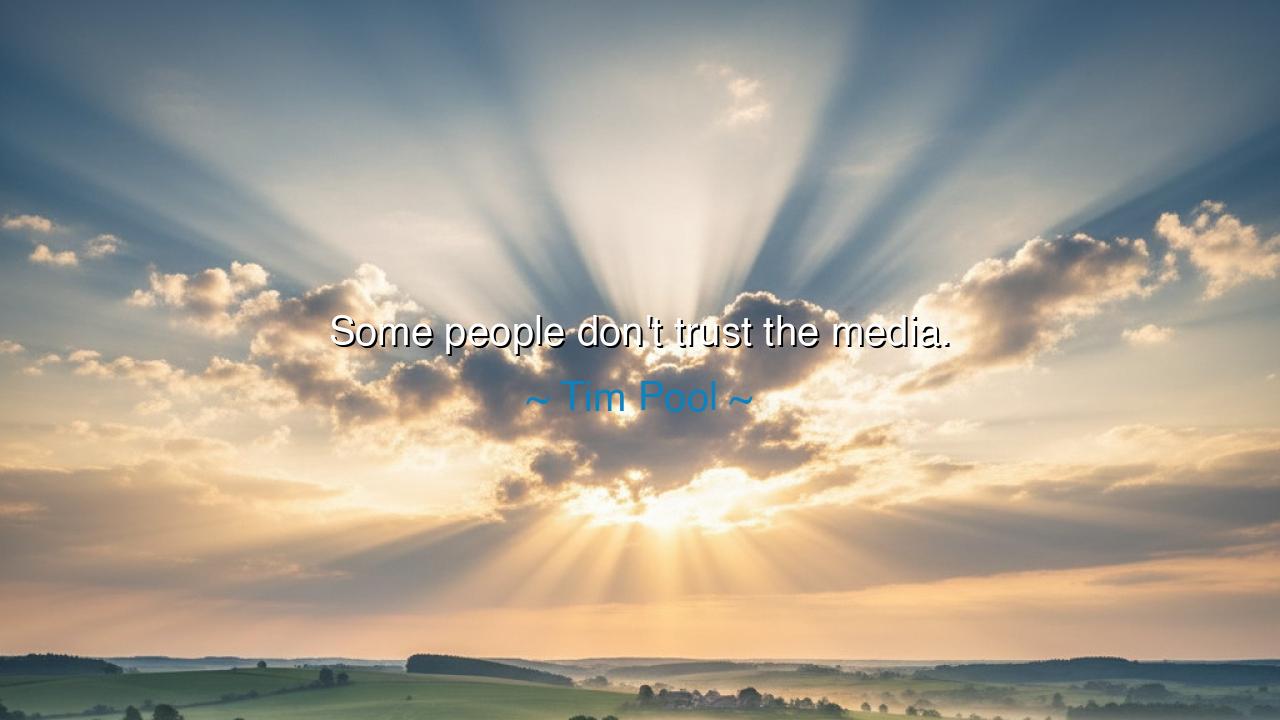
Some people don't trust the media.






The words of Tim Pool are brief, yet they strike like an arrow into the heart of our age: “Some people don’t trust the media.” Though simple in form, these words reveal the fracture between the storytellers and the people, between the institutions that shape perception and the citizens who must live by those perceptions. To speak of trust is to speak of the very foundation of society, for without trust, no voice carries weight, no authority endures, no bridge between ruler and ruled can hold. Thus Pool points not merely to skepticism, but to a deep wound in the body of public life.
The origin of this quote lies in the modern era, where the media—once seen as the guardian of truth, the messenger of the people’s voice—has become contested ground. In the days of earlier centuries, newspapers and heralds were trusted because their very survival depended on their bond with the community. But in our time, with vast corporations, instant communication, and endless streams of information, suspicion has grown. Many now believe that news does not only report reality but shapes it, bends it, even manipulates it. Pool’s words echo this sentiment: that to some, the media no longer stands as an impartial mirror, but as a tool of power.
History has shown the danger of broken trust between people and their messengers. Consider the fall of the Soviet Union, where state-run media endlessly proclaimed prosperity while the people stood in breadlines. The gap between word and reality bred cynicism so deep that the system itself collapsed. Similarly, in the Vietnam War, American citizens first trusted official reports of progress, but when images of suffering and stories of lies emerged, faith in both government and press was shaken for generations. In these stories we see what Pool observed: when trust is lost, even truth itself struggles to find a home in the hearts of the people.
Yet we must not take these words only as condemnation of the media. They are also a mirror for ourselves. For trust is not only something given, it is something cultivated. If the people no longer trust, it is because they feel unheard, unseen, or deceived. The wise must therefore ask: how can this bond be restored? How can voices once more be trusted to speak what is real, not what is convenient? In this questioning lies the possibility of renewal, for broken trust is not the end, but an invitation to rebuild.
But let us also be cautious: suspicion, when unchecked, can become its own poison. If the people trust no voice, if every report is cast aside as manipulation, then truth itself becomes unreachable. A society drowning in cynicism loses its compass, unable to distinguish between lies and reality. The lesson, then, is balance: to question, but not to despise; to demand accountability, yet not to abandon entirely the pursuit of common truth. Distrust without discernment leads to chaos, just as blind trust leads to deception.
The teaching is this: cultivate wisdom in yourself. Read widely, seek multiple sources, and compare what you hear with what you see in the world around you. Hold the media accountable, but also hold yourself accountable as a seeker of truth. If a voice proves false, reject it; if a voice proves honest, honor it. Just as in ancient marketplaces one learned which merchants were fair and which were cheats, so too must we learn which messengers deserve our trust.
Therefore, remember Pool’s words: “Some people don’t trust the media.” Hear them not only as a complaint, but as a challenge. For society cannot stand without voices to carry news, nor can it endure if those voices are doubted by all. Each of us, then, must become both guardians and seekers of truth. Question boldly, test carefully, and speak honestly, that the bond of trust may be restored. Only then can truth regain its rightful place as the foundation of peace, freedom, and understanding among men.
–––






AAdministratorAdministrator
Welcome, honored guests. Please leave a comment, we will respond soon